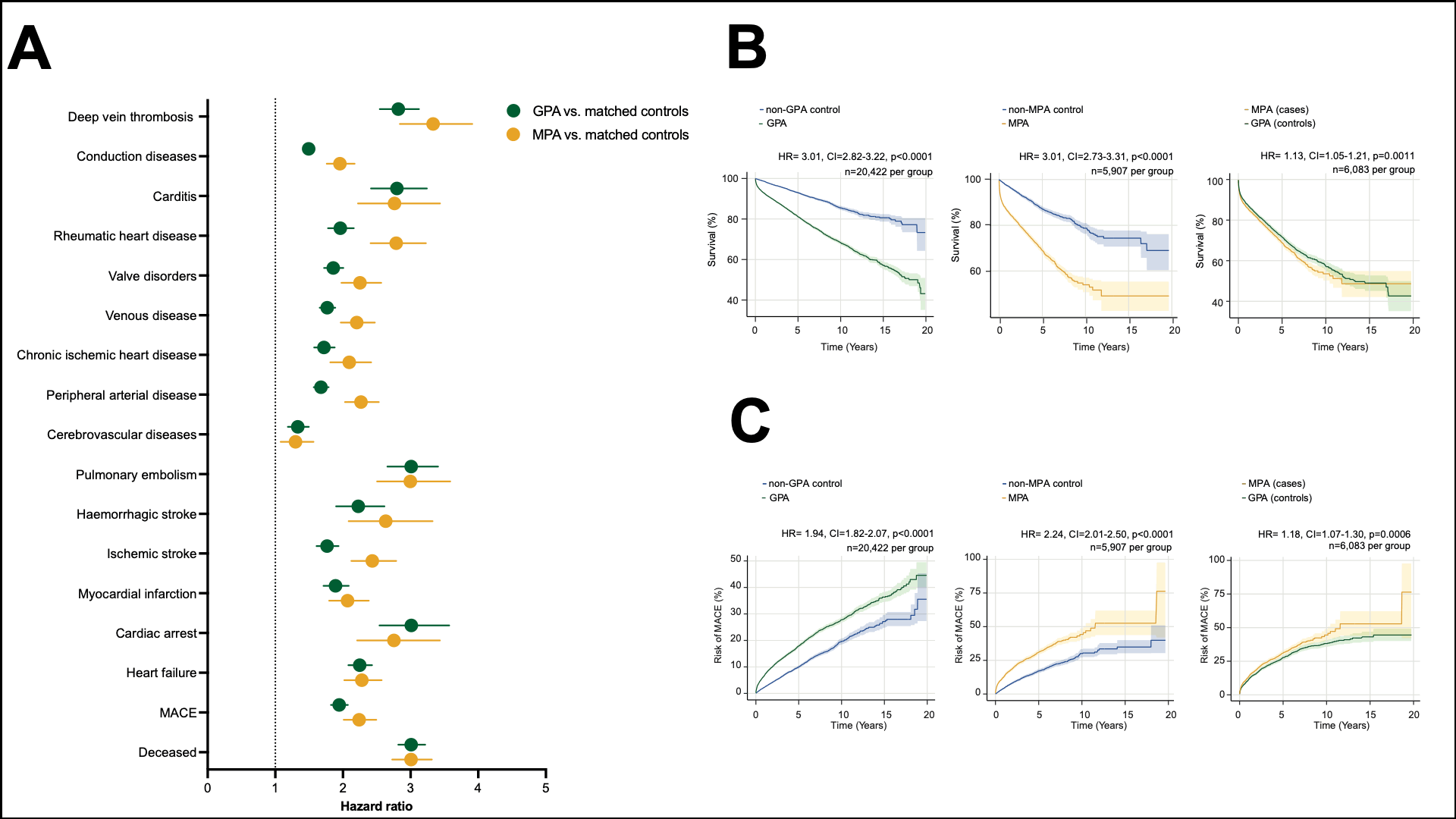Session Information
Session Type: Poster Session A
Session Time: 10:30AM-12:30PM
Background/Purpose: In spite of significantly improved therapy during the last years, long-term morbidity and mortality has remained high in ANCA-associated vasculitis (AAV). The main causes of death within the first year after diagnosis are active vasculitis and infections, followed by cardiovascular disease, malignancies and infections during subsequent years [1,2]. Population-based database and cohort analyses suggest an increased risk for major adverse cardiovascular events (MACE) in AAV [3].
Methods: In this retrospective cohort study, data samples from an electronic health records database of the US-based TriNetX network were analysed. Patients (aged ≥ 18 years) with the diagnostic codes of granulomatosis with polyangiitis (GPA) or microscopic polyangiitis (MPA) and patients without vasculitis as matched control cohort (1:1) were included. Propensity score matching for demographic variables (age, gender, family history of ischemic heart disease and other disease of the circulatory system, personal history of nicotine dependence) and comorbidity (nicotine dependence, overweight and obesity, dyslipoproteinaemia, arterial hypertension, chronic lower respiratory diseases, chronic kidney disease, neoplasms, diabetes mellitus) was performed to optimize between-group comparability. Hazard ratios (HR) related to death and cardiovascular outcomes (MACE, heart failure, cardiac arrest, myocardial infarction, ischemic stroke, haemorrhagic stroke, pulmonary embolism, cerebrovascular disease, peripheral arterial disease, chronic ischemic heart disease, venous disease, valve disorder, rheumatic heart disease, carditis, conduction disease, deep vein thrombosis) were calculated by univariate Cox regression after analysis of the matched cohort by the Kaplan-Meier method. Pvalues were determined by the Log-rank test.
Results: We identified 20.422 patients with GPA and 5.907 with MPA. The unadjusted and adjusted relative risk (RR) of mortality was increased in GPA (RR 17.87%) and MPA (RR 25.85%) compared to matched controls (GPA: HR: 3.01 P < 0.0001; MPA: HR: 3.01, P < 0.0001; figure 1A and 1B). Compared to GPA, patients with MPA had an increased risk of death within 20 years (MPA vs. GPA: HR: 1.18, P = 0.0006; figure 1B). The risks for all screened cardiovascular events were increased in GPA and MPA compared to matched controls, especially for MACE (GPA: HR 1.94, MPA: HR 2.24, P < 0.0001; figure 1A and 1C) and thromboembolic events (deep vein thrombosis: GPA HR: 2.82, MPA HR: 3.33; pulmonary embolism: GPA HR: 3.01, MPA HR: 3.00; P < 0.0001, figure 1A) and did not differ when adjusted according to gender, disease duration (first 3 years after diagnosis), and age (patients < 46 years, patients > 64 years). Compared to GPA, MPA patients had a higher risk for MACE (MPA vs. GPA: HR: 1.130 P = 0.0011, figure 1C) and peripheral arterial disease (MPA vs. GPA: HR: 1.165, P = 0.0018).
Conclusion: In AAV, the risk of death and cardiovascular events were increased. Compared to GPA, MPA was associated with an increased mortality and risk for MACE and peripheral arterial disease.
References:
1. Arnold S et al. Lancet Rheumatol. 2024
2. Sánchez Álamo B et al. Nephrol Dial Transplant. 2023
3. Massicotte-Azarnioch D et al. Clin Kidney J. 2021
To cite this abstract in AMA style:
Klapa S, Nording H, Ludwig M, Arnold S, Kridin K, Staehle A, Ludwig R, Lamprecht P. ANCA-associated Vasculitis (AAV) and Long-term Risk of Cardiovascular Disease: Large-scale Propensity-matched Global Retrospective Cohort Study [abstract]. Arthritis Rheumatol. 2024; 76 (suppl 9). https://acrabstracts.org/abstract/anca-associated-vasculitis-aav-and-long-term-risk-of-cardiovascular-disease-large-scale-propensity-matched-global-retrospective-cohort-study/. Accessed .« Back to ACR Convergence 2024
ACR Meeting Abstracts - https://acrabstracts.org/abstract/anca-associated-vasculitis-aav-and-long-term-risk-of-cardiovascular-disease-large-scale-propensity-matched-global-retrospective-cohort-study/

